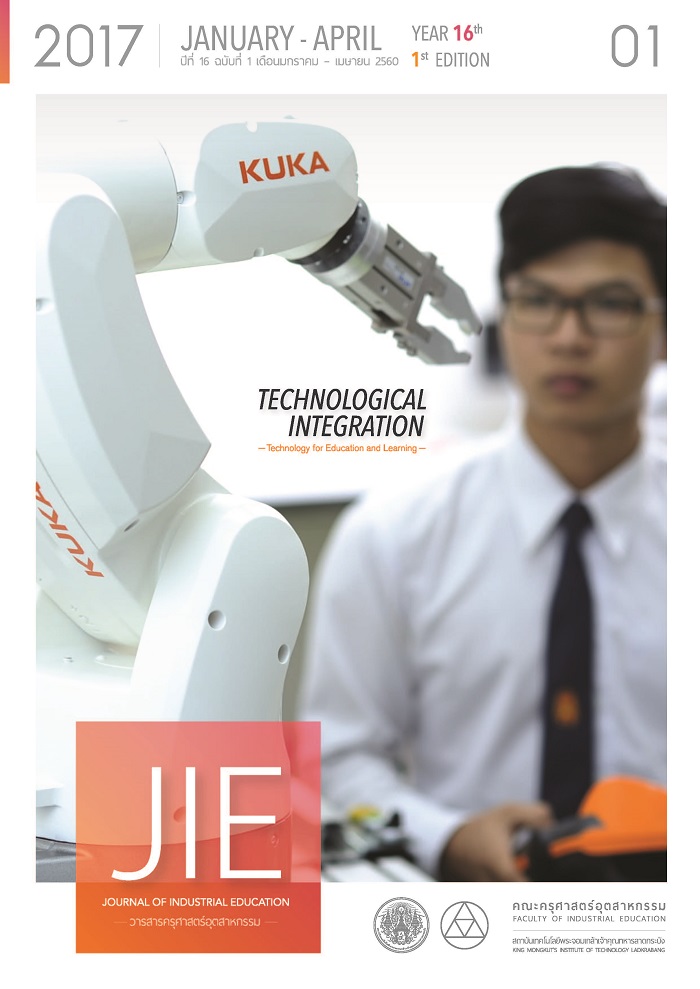DEVELOPMENT OF WEB INFORMATION TECHNOLOGY OF FACULTY OF INDUSTRIAL EDUCATION IN KING MONGKUT’S INSTITUTE OF TECHNOLOGY LADKRABANG
Keywords:
Information, Web Information, Development, Development Information TechnologyAbstract
The Faculty of Industrial Education, King Mongkut's Institute of Technology Ladkrabang in Thailand aims to create knowledge for graduate students to achieve academic excellence through the high quality of information technology system. The development of learning process requires the integration with information technology system in order to enhance the highest value of users. The purposes of this research were to: 1) to educate students, as end users, about information technology 2) to develop the information technology system by using CMS: Joomla: and Moodle (e-Learning) 3) to evaluate the users’ satisfaction towards the information technology system. The experimental samples of this research which consisted of 341 persons included Board of directors, Lecturers, Undergraduate students, Graduate students in the Faculty of Industrial Education, King Mongkut's Institute of Technology Ladkrabang. The data were collected by using the questionnaire. The result were analyzed by SPSS (Statistic Package for the Social Sciences). The used statistics included percentage, mean, and standard deviation. The result of the research indicates that the quality of Web information technology was at high level and the users’ satisfaction was at high level.
References
[2] Karimi, F., Poo, D. and Tan, Y. 2015. Clinical information systems end user satisfaction The expectations and needs congruencies effects. Journal of Biomedical Informatics, 53, p.342-354.
[3] W . Winston, R. 2003. Educational administration: Managing the development of large software systems. Proceedings IEEE Wescon, p.1-9.
[4] S tefanou, C. 2003. System Development Life Cycle In Encyclopedia of Information Systems. Elsevier, p.329-344.
[5] C avus, N. 2015. Distance Learning and Learning Management Systems. Procedia Social and Behavioral Sciences, 191, p.872-877.
[6] Gamalielsson, J., Lundell, B., Feist, J., Gustavsson, T. and Landqvist, F. 2015. On Organisational Influences in Software Standards and Their Open Source Implementations. Information and Software Technology, 67, p.30-43.
[7] H arpe, S. 2015. How to Analyze Likert and Other Rating Scale Data. Pharmacy Teaching and Learning, 7(6), p.836-850.
[8] Murray, L., Booth, T. and McKenzie, K. 2015. An analysis of differential item functioning by gender in the Learning Disability Screening Questionnaire (LDSQ). Research in Developmental Disabilities, 39, p.76-82.
[9] Pattanama, N., Chachiy, M., Suwanjan, P. and Tangkunanan, P, 2015. The Development of Computer-Assisted Instruction of Plant and Animals for Pratomsuksa Students. Journal of Industrial Education. 14 (1), p.42-47.
Downloads
Published
How to Cite
Issue
Section
License
"The opinions and contents including the words in papers are responsibility by the authors."
"ข้อคิดเห็น เนื้อหา รวมทั้งการใช้ภาษาในบทความถือเป็นความรับผิดชอบของผู้เขียน"



